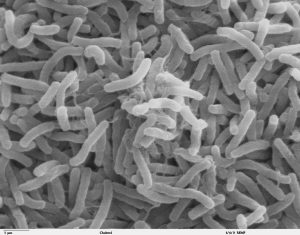By NewsDesk @infectiousdiseasenews
The Taiwan CDC reported the first locally acquired cholera case of the year in a 80 year old man. The patient presented at the hospital with diarrhea, general weakness, and dizziness on August 31.

http://remf.dartmouth.edu/images/bacteriaSEM/source/1.html
Health officials say the patient has no recent history of domestic and foreign travel. He usually cooks three meals by himself, drinks boiled tap water, and treats raw and cooked food separately. However, there is a habit of eating separate meals, and family members who live with him now undoubtedly have symptoms. The health unit has initiated various epidemic prevention and control investigations, and collected samples from family members and water environment samples from their families for inspection to identify possible sources of infection.
Toxic Vibrio cholerae (serotype O1-Ogawa) was confirmed.
Cholera is an acute bacterial intestinal infection. The incubation period is usually 2 to 3 days. It is spread through the consumption of contaminated food or water. Vibrio cholerae has poor resistance to gastric acid and usually requires a large amount of bacteria to cause disease. However, in people with insufficient gastric acid, gastrectomy, or people with poor immune function, a small amount of bacteria may cause disease. Symptoms of infection include a lot of watery diarrhea like rice soup, vomiting, rapid dehydration, acidosis and circulatory failure. The fatality rate of severely untreated patients can exceed 50%, but if appropriate treatment is given, it can be reduced to less than 1%.
- Myanmar: WHO says trachoma eliminated
- Thailand dengue fever update: 55K cases reported to date
- Philippines COVID-19 cases top 269K, Props to RITM
- COVID-19: Patients with sleep apnea could be at additional risk
- Immunosuppressive drugs for psoriasis and RA do not increase risk for COVID-19: Henry Ford study
- Cholera outbreak in Ethiopia nears 15K cases
- Dengue fever cases up 22% in Federal District, Brazil

